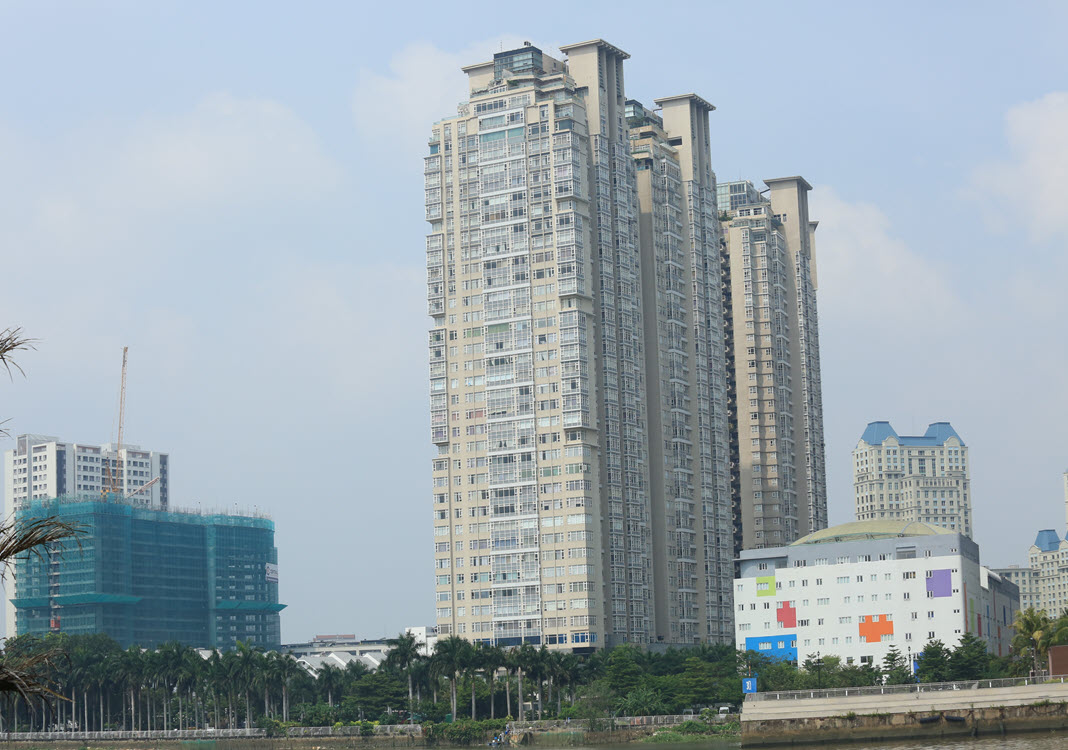Heavy debts and tightened credits plus sales slump due to the Covid-19 pandemic will soon expose the Achilles’ heel of many financially weak real estate enterprises. Here is why.
Due to the negative impact of the Covid-19 pandemic, supplies in the real estate market, especially in the two big cities of Hanoi and HCMC, in Q1 continued to slide against Q4, 2019. They were also the lowest Q1 supplies over the past five years.
In Hanoi, statistics from the consulting and market research firm JLL Vietnam show that official apartment offers in Q1 were only 4,600 units from 12 projects, down 65% from Q4 2019. The supply drop also dent market liquidity. The middle-end segment took the lead in apartment sales in Hanoi, accounting for 83% of the market share. They were mainly apartments on the outskirts like Gia Lam and Long Bien districts.
In HCMC, Q1 apartments sales were only 1,980 units, more than half below the sales recorded in Q1 and Q4, 2019, and accounted for some 54% of supplies available in the quarter, the lowest level since Q2, 2017. Most deals were from projects with sales offers before Covid-19. The low-cost and middle-end segments continued to lead the way, accounting for 80% of total apartment sales and meeting the actual residence demand. The slowdown in the investment demand, mainly in the high-end segment, has become more visible amid Covid-19.
The reason for the liquidity slump in the real estate market is the prolonged regulatory approval procedure and developers’ delay of sales offers due to the restriction on large gatherings to prevent Covid-19, which have reduced new supplies. In addition, the pandemic has slowed down the construction progress and sales plans of some projects. Of note, despite the market slump, real estate prices in Q1 did not fall against the previous quarter, and no enterprises have announced price reduction policies. However, this may be only an effort to hold out. Price reductions will probably intensify over the next quarters, especially for transactions in the secondary market, and affect price offers of new projects.
Poor business results
A number of construction and real estate firms have recently published business performance reports for Q1. Except Vinhomes who has reported big profit from sales of its projects last year, most listed real estate firms have poor business results.
The construction joint-stock company Coteccons (CTD) recorded VND123.5 billion in after-tax profit, down 35% from Q1 2019. Its gross profit in Q1 was VND194 billion, or a profit margin of 5.47%, lower than the rate of 6.43% in Q1 last year.
Dat Xanh Group (DXG) also published its Q1 consolidated financial report, with sales down 60% and after-tax profit of the parent company down 78%, at VND602 billion and VND67.5 billion, respectively. Apartment and land lot sales plunged as much as 97% and contributed the least to total sales, as compared with a 55% share in Q1 last year.
Phat Dat Real Estate (PDR), which is preparing for development of a big project in Binh Duong Province, has also posted gloomy business in the early months of this year. Its revenue from sales and services in Q1 was only VND629 billion, a slump of nearly VND1.1 trillion compared with Q1 last year.
The investment joint-stock company LDG (LDG) recorded the biggest fall in profit. Its Q1 net revenue was only VND66 billion as compared with VND313 billion in the same period last year. After-tax profit was a mere VND1.4 billion, or 1.1% of the profit of VND120 billion in Q1 last year.
In all, the reason for the profit slump of real estate enterprises is customers have shunned contacts and transactions due to Covid-19, in addition to lack of supplies. The social distancing rule has forced construction companies to suspend work in some localities, and workers have been laid off, affecting their operations.

Debt concern
The risk of debts by real estate enterprises has emerged when the business prospect turns sour. According to statistics for capital sources in 2018-2019, debts payable by real estate enterprises began to swell. The total debts payable by 13 enterprises in the observation sample (VIC, VHM, NVL, BCM, FLC, DXG, KDH, SNZ, NLG, PDR, DIG, HDG and LDG) was over VND590 trillion by end-Q4, 2019, an increase of VND188 trillion, or 46%, from the beginning of the year. Short-term debts were VND381 trillion, up 66% or VND151 trillion. Long-term debts were over VND210 trillion, up 24%.
Besides the increase in absolute value, the debt-equity ratio of real estate enterprises has also grown. By end-2019, Ha Do Group (HDG) had the highest debt-equity ratio, at up to 3.21. According to its Q4 consolidated financial report, the debt payable was over VND10.211 trillion. Interest payable loans were VND5.82 trillion, accounting for the largest share (57%) of debts payable.
Following Ha Do is Vingroup (VIC) with the debt-equity ratio of 2.39. Meanwhile, some enterprises with low financial leverage have much lower ratios, such as Khang Dien Housing Investment and Trading (KDH) with 0.72, Nam Long Investment (NLG) with 0.74 and the investment company LDG 0.87.
Big loans and tightened credits, along with sales slump due to Covid-19, will soon expose the Achilles’ heel of some financially weak real estate enterprises. The risk of mass default will certainly occur if the pandemic shows complex developments again in the upcoming time.









